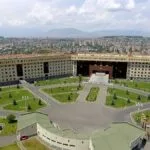Georgia witnessed a week of escalating political unrest from December 15 to 19, marked by mass protests, international responses, and increasing demands for justice, transparency, and European integration. Key events from this tumultuous week demonstrate the intensity and complexity of the situation in the country.
Protests intensified across Georgia, with marches converging on Rustaveli Avenue in Tbilisi. Demonstrators, representing various social groups, demanded the release of detainees, snap elections, and alignment with European values. Among the protests were marches by fathers, basketball players, students, and individuals with disabilities, highlighting the widespread nature of discontent. Participants expressed solidarity with those injured or arrested during earlier demonstrations, emphasizing the importance of safeguarding democratic principles.
One of the most striking events was the solidarity shown by Shota Rustaveli Theater and Film University, whose administration called for the release of unlawfully detained individuals, including prominent actors. Meanwhile, representatives from the medical field joined protests near the parliament, underscoring the diverse voices uniting in the fight for justice and democracy.
Amid the domestic turmoil, international responses added pressure on the Georgian government. Estonia and Lithuania expanded sanctions on Georgian officials implicated in human rights violations, calling for a broader EU response. The Netherlands and Sweden also expressed their concerns, urging stronger actions against the Georgian government. The European Union discussed suspending the visa-free regime for Georgian diplomats and officials, sending a clear signal about the consequences of undermining democratic norms.
Opposition leaders played a significant role in the unfolding events, calling on the OSCE/ODIHR to activate the Moscow Mechanism to investigate election misconduct and government repression. Accusations against Georgian Dream’s leadership intensified, with opposition members alleging systemic corruption and human rights violations.
Local businesses also joined the movement, with over 600 companies uniting under the Free Business Platform to call for new elections and de-escalation. Financial support from major banks and international organizations aimed to assist protesters and small businesses affected by the unrest.
The week also saw shocking revelations of police brutality, as activists recounted threats and injuries sustained during their arrests. Alleged government-backed thugs, arrested for violent threats, were released on bail, raising questions about judicial impartiality.
International voices amplified the call for change. Estonian civil society organizations expressed solidarity with Georgian protesters, while European foreign policy experts warned of Georgia’s drift toward authoritarianism. U.S. and EU officials reiterated their commitment to supporting the Georgian people, with promises of further sanctions and aid packages.
This week of political and social upheaval highlights the growing divide between the Georgian government and its people. The demand for democratic reform and European integration remains strong, with both domestic and international actors emphasizing the need for accountability and justice. The coming weeks will be crucial in determining Georgia’s path and whether the voices of its citizens will be heeded.









